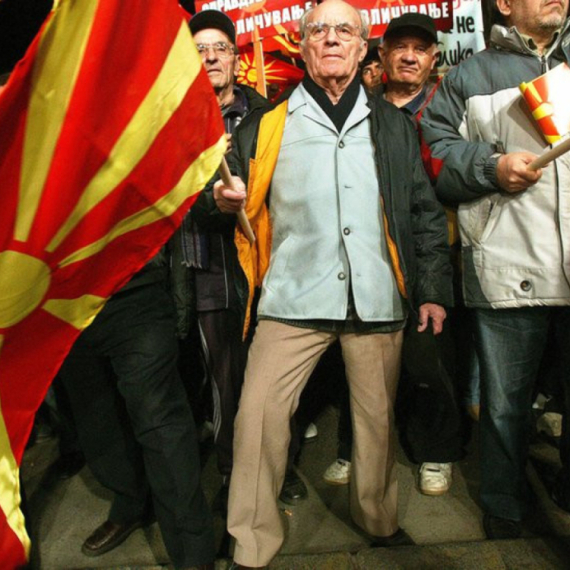Reactions to controversial internet rule
A media association yesterday criticized <a href="http://www.b92.net/eng/news/society-article.php?yyyy=2008&mm=07&dd=28&nav_id=52260" class="text-link" target= "_blank">a decision</a> to allow the state unlimited access to private internet data.
Tuesday, 29.07.2008.
11:32

A media association yesterday criticized a decision to allow the state unlimited access to private internet data. The Association of Independent Electronic Media (ANEM) strongly condemned the document, dubbed, "Technical conditions for sub-systems, equipment and installations of internet networks", adopted by the Management Board of the Republic Telecommunications Agency, RATEL, on July 11, which went into effect on the following day. Reactions to controversial internet rule "ANEM is of the opinion that the 'Technical Conditions' document that was adopted by RATEL will serve to enable serious and unlimited invasion into the basic human rights that are guaranteed by the Republic of Serbia Constitution and by the Convention for the Protection of Human Rights and Fundamental Freedoms, and especially the freedom to expression and privacy, that is, confidentiality of the means of communications," a statement issued in Belgrade, signed by the associations chairman Sasa Mirkovic, reads. While ANEM does not contest the ISPs obligation to establish such sub-systems, in order to legally monitor some telecommunication, it contests the procedure of adoption of the document, which it says came about with "no cooperation and/or consultations, with the telecommunications operators, in spite of the fact that RATEL is legally obliged to hold such consultations". At the same time, the statement says, "the scope of privacy invasion permitted is excessive and absolutely out of proportion with the overall aim to enable the legally prescribed electronic monitoring or supervision". ANEM also reminded that the constitution and the Convention for the Protection of Human Rights and Fundamental Freedoms have prescribed conditions that permit restrictions of the freedom to expression and right to privacy only on exceptional grounds, among other condition that "the public interference must be proportionate to the legitimate aim pursued". The ANEM statement continues that the document, such as it had been adopted, "leave space for an unselective, uncontrollable and unjustifiable monitoring of the citizens' internet activities, gathering and analysis of statistical data in relation to such activities, e-mail message and attachment interception and processing of web mail, interception of IP telephone communications, facsimiles and IP video communications, interception of instant messenger communications, interception of communications in peer-to-peer networks and the similar, by various state institutions". The association demands that RATEL revoke the contentious document and organize public consultations with telecommunication operators, "as required by the Telecommunications Act", and to define the conditions for legally authorized electronic monitoring of public Telecommunications, "in such a way to guarantee and protect the basic human rights of the people who use the telecommunications services".
Reactions to controversial internet rule
"ANEM is of the opinion that the 'Technical Conditions' document that was adopted by RATEL will serve to enable serious and unlimited invasion into the basic human rights that are guaranteed by the Republic of Serbia Constitution and by the Convention for the Protection of Human Rights and Fundamental Freedoms, and especially the freedom to expression and privacy, that is, confidentiality of the means of communications," a statement issued in Belgrade, signed by the associations chairman Saša Mirković, reads.While ANEM does not contest the ISPs obligation to establish such sub-systems, in order to legally monitor some telecommunication, it contests the procedure of adoption of the document, which it says came about with "no cooperation and/or consultations, with the telecommunications operators, in spite of the fact that RATEL is legally obliged to hold such consultations".
At the same time, the statement says, "the scope of privacy invasion permitted is excessive and absolutely out of proportion with the overall aim to enable the legally prescribed electronic monitoring or supervision".
ANEM also reminded that the constitution and the Convention for the Protection of Human Rights and Fundamental Freedoms have prescribed conditions that permit restrictions of the freedom to expression and right to privacy only on exceptional grounds, among other condition that "the public interference must be proportionate to the legitimate aim pursued".
The ANEM statement continues that the document, such as it had been adopted, "leave space for an unselective, uncontrollable and unjustifiable monitoring of the citizens' internet activities, gathering and analysis of statistical data in relation to such activities, e-mail
message and attachment interception and processing of web mail, interception of IP telephone communications, facsimiles and IP video communications, interception of instant messenger communications, interception of communications in peer-to-peer networks and the similar, by various state institutions".
The association demands that RATEL revoke the contentious document and organize public consultations with telecommunication operators, "as required by the Telecommunications Act", and to define the conditions for legally authorized electronic monitoring of public
Telecommunications, "in such a way to guarantee and protect the basic human rights of the people who use the telecommunications services".


























































Komentari 1
Pogledaj komentare